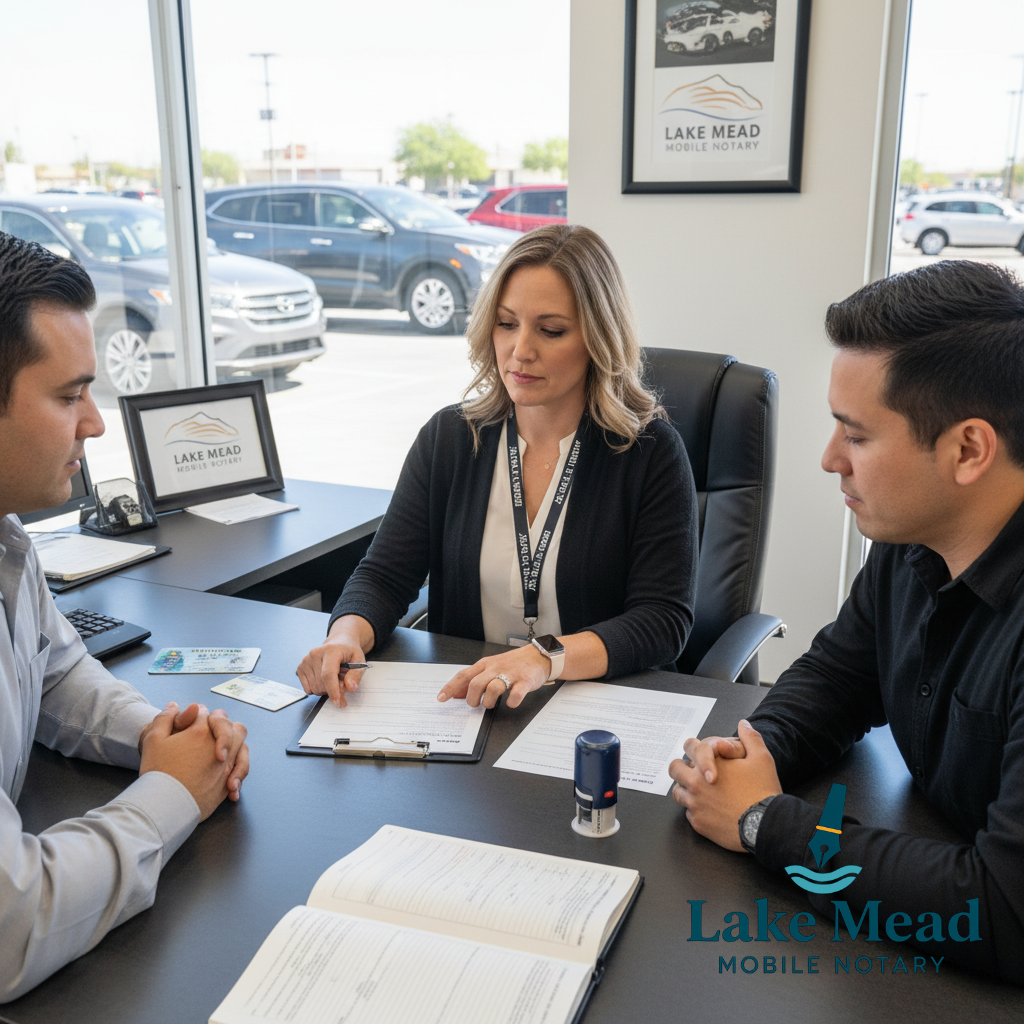Nevada DMV Form VP-136 must be signed by the principal in front of a commissioned Nevada notary, with valid ID and complete vehicle details.
Typical mobile notarization for VP-136 is $45–$55 for standard daytime appointments; after-hours or emergency requests may incur additional fees. Lake Mead Mobile Notary provides same-day mobile VP-136 notarization with Nevada-compliant acknowledgment certificates across Henderson, North Las Vegas, Boulder City, Paradise, and the entire Las Vegas Valley.
This guide explains exact requirements, common errors to avoid, and a step-by-step process so your VP-136 is accepted the first time at Nevada DMV counters.
⚖️ Why Proper VP-136 Notarization Matters
VP-136 creates a legally binding agency relationship that lets your authorized agent complete vehicle transactions without you present. DMV title clerks rely on the notary’s acknowledgment to verify identity and intent—if anything is off, the packet is rejected and your sale, registration, or duplicate title is delayed. Typical rejection causes include pre-signed forms, nickname use that does not match the title, wrong VIN, or a missing/incorrect Nevada acknowledgment certificate. Rejections add days of delay and can trigger storage, floor-plan interest, or penalty fees for businesses and private sellers.
- Compliance: Nevada DMV requires original wet-ink signatures and a proper Nevada acknowledgment certificate on VP-136.
- Risk Control: Notarization reduces fraud risk and creates an auditable record of identity verification and voluntary signing.
- Operational Impact: For dealers and fleets, each day a transaction stalls can cost $150–$300 in carrying costs and lost productivity.
- Convenience: Mobile notarization coordinates principal availability at home, office, dealership, or tow yard—no DMV pre-line signing needed.
📋 How It Works: Step-by-Step
Download the current VP-136
Obtain the latest form from dmv.nv.gov. Fill in principal and agent information, vehicle details (year, make, model, full 17-character VIN), and the specific powers granted. Do not sign before meeting the notary.
Gather valid identification
The principal needs a current government-issued photo ID (Nevada driver license or state ID, U.S. passport, military ID, or out-of-state license). The name on ID must match the vehicle title and the VP-136 exactly.
On-site verification
Your notary checks ID, confirms willingness and awareness, and ensures the form is complete. The principal signs in the notary’s presence; the agent does not need to attend.
Nevada acknowledgment certificate
We complete a Nevada-compliant acknowledgment including date, county, commission number/expiration, notary signature, and official seal. This is the most common point of failure when DIY notarizations omit required certificate language.
DMV submission
The agent brings the original notarized VP-136 to DMV with the rest of the packet. Photocopies or scans are not accepted for VP-136.
✅ Complete VP-136 Requirements
Principal Requirements
- Appear in person before a Nevada notary (no phone/email/video).
- Present valid government photo ID; name must match the title/VP-136.
- Sign in wet ink while the notary witnesses the signature.
Form Completion Requirements
- Principal and agent full legal names and mailing addresses.
- Vehicle year, make, model, and full 17-character VIN.
- Specific powers granted (title transfer, registration, duplicate title, lien release).
- No blank lines for critical fields; no nicknames; no pre-signing.
Notarial Certificate Requirements
- Nevada acknowledgment wording (not a jurat).
- Date, county, notary commission number and expiration, signature, and seal.
- Legible seal impression; no expired commission; no cross-outs on the certificate.
Tip: If the principal’s name on the title differs from their ID (married/maiden, hyphenation, spacing), pair VP-136 with a notarized “One and the Same” (VP-185) to avoid clerk challenges. See our on-demand service for VP-185.
💰 Pricing, Timeline & ROI
$45–$55
Standard VP-136 Notarization
$55
Principal + Agent Present
$10
Each Related Add-On Doc
Included
Travel in Core Area
Additional Fees
After-Hours / Emergency
Cost comparison: Traditional trips to banks/UPS often add 60–90 minutes of travel/waiting, $13–$27 in gas/parking, and $40–$65 in lost time. Total traditional cost ≈ $85–$140. Mobile service is typically $45–$55 with onsite convenience—saving ~35–60% per transaction.
❓ Common Questions
Do both the principal and agent need to be present for notarization?
No. Only the principal—the person granting the power—must appear before the notary and sign the document. The agent can receive the notarized form later to use at the DMV.
Is Remote Online Notarization (RON) accepted for a VP-136?
For Nevada DMV VP-136 forms, original wet-ink signatures are required. You must plan for a traditional, in-person notarization to avoid having the document rejected by DMV clerks.
Which documents are often notarized with a VP-136?
It's common to notarize a Bill of Sale, Duplicate Title Application (VP-012), or Lien Release (VP-186) in the same appointment. We can handle multiple vehicle title documents in a single visit.
🗺️ Where We Serve
Same-day VP-136 mobile notarization across the valley, including targeted neighborhoods and districts for faster coordination:
🌆 Paradise & Spring Valley
Strip-adjacent residents, insurance adjusters, and dealer trade-ins. Paradise • Spring Valley
🏜️ Boulder City
Extended coverage with no extra mileage inside city limits. Boulder City
🏘️ Summerlin South
Master-planned communities and estate administration signings. Summerlin South
📋 Related Services
Learn More
